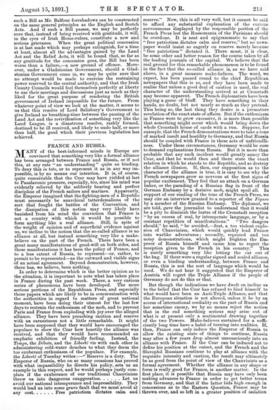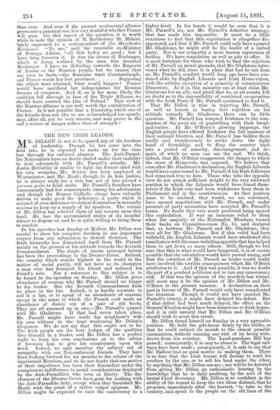FRANCE AND RUSSIA. --Ivi ANY of the best-informed minds in Europe
are convinced that something very like a formal alliance has been arranged between France and Russia, or if not this, at any rate "an understanding" quite as binding. To deny this in tote, or to represent it as in any way im- possible, is by no means our intention. It is, of course, quite conceivable that the Czar may have yielded at last to Panslavonic pressure, especially, too, since his mind was evidently relieved by the soldierly bearing and perfect discipline of the French sailors and marines. Apparently, the Emperor imagined that the fighting-men of a Republic must necessarily be anarchical tatterdemalions of the sort that fought the battles of the Convention, and the dissipation of this notion may very likely have banished from his mind the conviction that France is not a country with which it would be possible to form anything like a real alliance. Still, in spite of the weight of opinion and of superficial evidence against us, we incline to the notion that the so-called alliance is no alliance at all, but instead something very like a make- believe on the part of the French. There have been a great many manifestations of good-will on both sides, and these manifestations it has been the policy of France, and to a less extent of Russia, to represent—or, rather, to permit to be represented—as the outward and visible signs of an actual agreement. Beyond demonstration, however, there has, we believe, been nothing. In order to determine which is the better opinion as to the situation, it is important to note what has taken place in France during the past week. There, a very curious series of phenomena have been developed. The more serious portions of the Republican Press, and especially those papers which are likely to be in communication with the authorities in regard to matters of great national moment, have been doing their utmost for the last few days to restrain the enthusiasm of the mob, and to prevent Paris and France from exploding with joy over the alleged alliance. They have been preaching caution and reserve with an earnestness not a little remarkable. It might have been supposed that they would have encouraged the populace to show the Czar how heartily the affiance was received, and that they would have recommended an emphatic exhibition of friendly feeling. Instead, the Temps, the Debats, and the Liberte vie with each other in administering cold-water douches to what they deem the too exuberant enthusiasm of the populace. For example, the Libertg of Tuesday writes :—" Reserve is a duty. The Emperor of Russia, who on so many occasions has proved with what impassibility he directs his policy, sets us an example in this respect, and he would perhaps justly com- plain if the exuberance of our traditional Chauvinism threw us into dangerous exaggeration Let us avoid our national intemperance and impressibility. They would lead us into some grave fault that we must avoid at any cost. Free patriotism dictates calm and reserve." Now, this is all very well, but it cannot be said to afford any substantial explanation of the curious nervousnesss displayed by the responsible portion of the French Press lest the Russomania of the Parisians should be overdone. It is neat and epigrammatic to say that "free patriotism dictates calm and reserve," but no news- paper would insist so eagerly on reserve merely because "free patriotism" dictated it. There must, it is clear, be some other and better reason for the course taken by all the leading journals of the capital. We believe that the real ground for this remarkable phenomenon is to be found in the fact that the so-called alliance is, as we have said above, in a great measure make-believe. The word, we expect, has been passed round to the chief Republican newspapers that this is so, and they have been made to realise that unless a good deal of caution is used, the real character of the understanding arrived at at Cronstadt may become apparent. The French diplomatists have been playing a game of bluff. They have something in their hands, no doubt, but not nearly so much as they pretend. This being so, the last thing they desire is a premature revelation of the exact state of affairs. But if the enthusiasm in France were to grow excessive, it is more than possible that something might occur which would bring down the whole Cronstadt house of cards with a run. Suppose, for example, that the French demonstrations were to take a tone of marked insult and hostility to Germany, and that Russia should be coupled with France in these acts of unfriendli- ness. Under these circumstances, Germany would be sure to demand explanations from Russia. But it is more than probable that any such incident would greatly annoy the Czar, and that he would then and there state the exact relation in which he stands to the Republic, and so destroy the alliance illusion. If, then, our supposition as to the character of the alliance is true, it is easy to see why the French newspapers grow so nervous at the first signs of popular excitement. They feel that an attack on a German baker, or the parading of a Russian flag in front of the German Embassy by a derisive mob, might spoil all. In support of our reading of the tone of the French Press, we may cite an interview granted to a reporter of the Figaro by a member of the Russian Embassy. The diplomat, we are told, gave the journalist to understand that it would be a pity to diminish the lustre of the Cronstadt reception "by an excess of zeal, by intemperate language, or by a constant repetition of manifestations." "Two dangers should," he said, "be avoided,—first, a too violent explo- sion of Chauvinism, which would quickly lead France into warlike adventures ; secondly, repeated and too noisy demonstrations, which might frighten the Em- peror of Russia himself and cause him to regret the reception given to the French in his country." This is surely something very like letting the cat out of the bag. If there were a regular signed and sealed alliance, or even a binding understanding, between France and Russia, this is not the sort of language which would be used. We do not hear it suggested that the Emperor of Austria will regret the Triple Alliance if the people of Germany do not do this or that.
But though the indications we have dwelt on incline us to the belief that the Czar has refused to bind himself to what would have been an Anti-Triple Alliance, and that the European situation is not altered, unless it be by an access of international cordiality on the part of Russia and her sometime enemy, we by no means reject the notion that in the end something serious may arise out of what is at present only a sentimental drawing together of the two Powers. Make-believes sustained for a suffi- ciently long time have a habit of turning into realities. If, then, France can only induce the Emperor of Russia to allow the existing state of things to continue, Russia may after a few years drop almost unconsciously into an alliance with France. If the Czar can be induced not to define his position at the outset, and the French and the Slavophil Russians continue to play at alliance with the requisite intensity and caution, the result may ultimately be as good from the point of view of the Chauvinists as a formal agreement. Whether the affiance in any shape or form is really good for France, is another matter. In the first place, it is possible that Russia may have only been making advances to France in order to get better terms from Germany, and that if the latter bids high enough in concessions as to the Eastern Question, France may be thrown over, and so left in a, greater position of isolation than ever. And even if the present sentimental alliance , grows into a practical one, it is very doubtful whether France will gain. On this aspect of the question, it is worth while to note the opinion of M. Barthelemy St. Hilaire, lately expressed to a correspondent of the Manchester Examiner. "To me," said the venerable ex-Minister of Foreign Affairs, "all this bodes no good ; but I have long foreseen it. It was the dream of Boulanger, which is being realised by the man who invented Boulanger. I have no ill-feeling towards the Emperor of Russia or the Russian people, but we cannot shut our eyes to facts,—the Russians want Constantinople, and France wants her lost proviuces Supposing the object were attained, what would happen ? France would have sacrificed her independence for Russian dreams of conquest. And if, as is far more likely, the coalition fell through in face of the Triple Alliance, we should have courted the fate of Poland." This view of the Russian affiance is one well worth the consideration of France. Is it not possible that a friendship which one of the friends does not like to see acknowledged too openly, may, after all, not be very sincere, and may prove in the end a source of danger rather than of strength ?



































 Previous page
Previous page